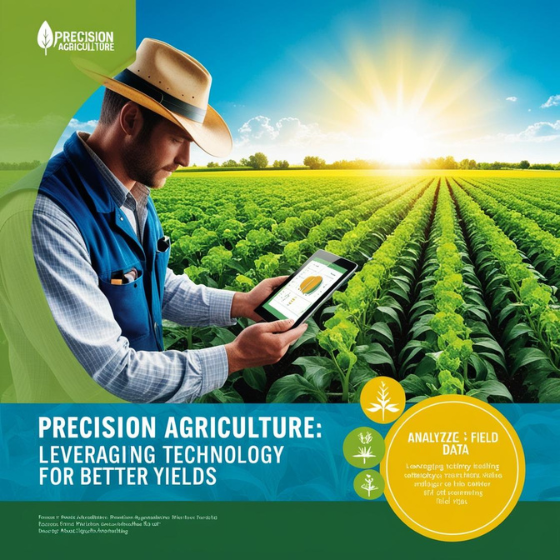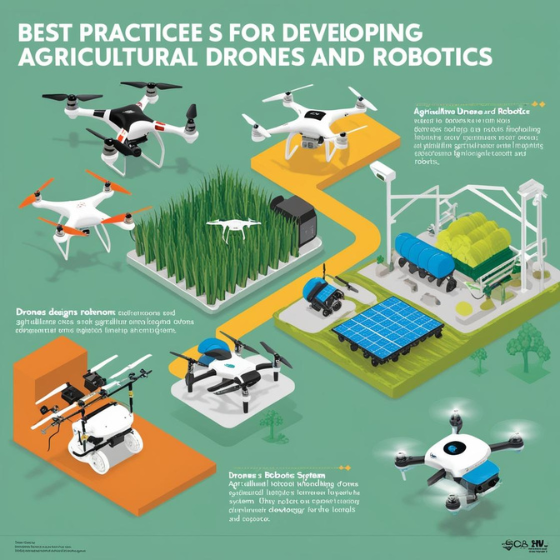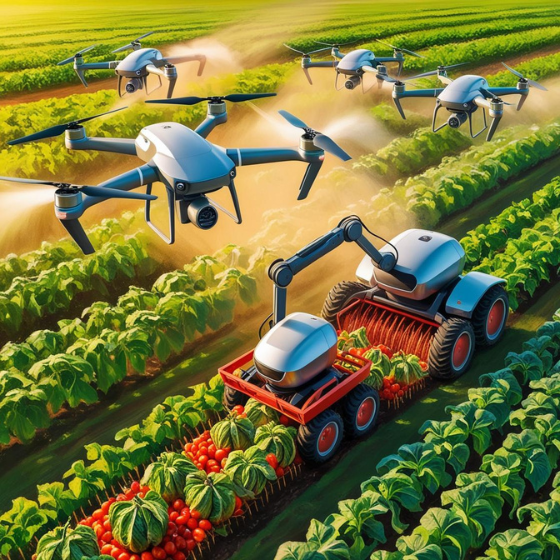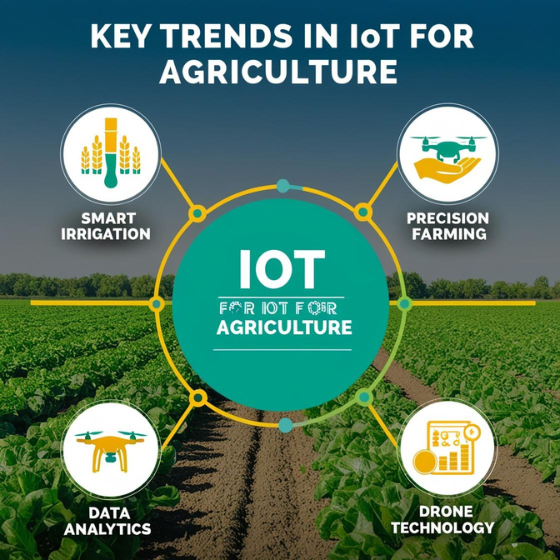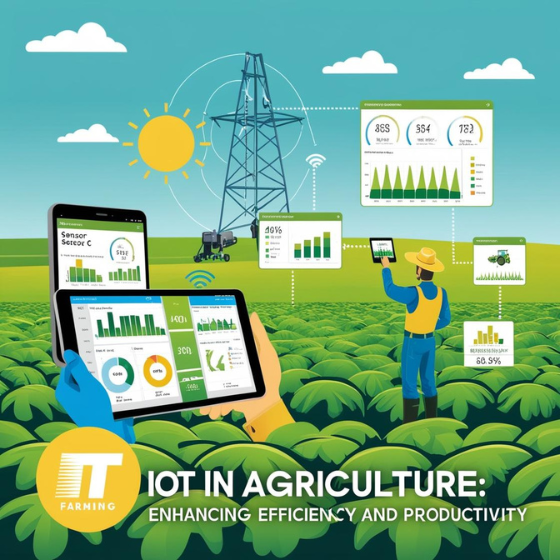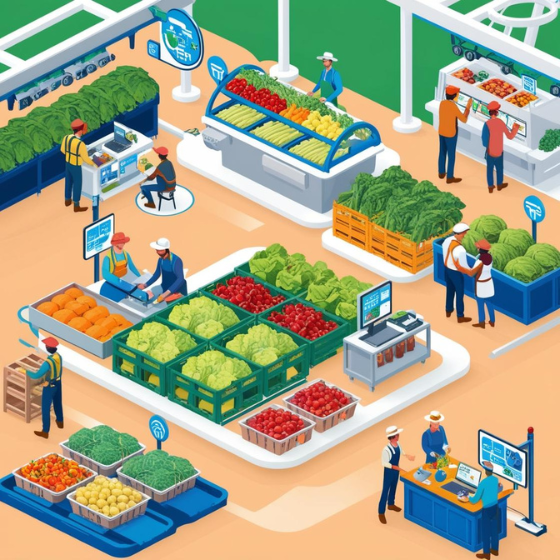Introduction
Did you know that by 2050, the global population is expected to exceed 9.7 billion people? With this rapid growth, the demand for food is anticipated to increase by nearly 70%. As a result, farmers face an enormous challenge: how to feed the growing population efficiently. To meet this demand, the agricultural industry must embrace innovation and technology. Precision agriculture: leveraging technology for better yields offers a powerful solution that promises to address these challenges, enabling farmers to optimize their resources, reduce waste, and achieve higher crop yields.
In this blog, we will explore the importance of precision agriculture, how technology is transforming farming practices, and the various tools driving this change. By the end of this article, you will understand how these innovations can revolutionize farming, enhance productivity, and promote sustainability.
1. What is Precision Agriculture?
Precision agriculture is a farming management concept that uses technology to monitor and optimize agricultural practices. Specifically, it involves the use of sensors, GPS, data analytics, and other advanced technologies to better manage crops and soil. By collecting and analyzing data in real time, precision agriculture allows farmers to make more informed decisions. Consequently, this leads to improved efficiency and productivity.
Core Components of Precision Agriculture:
- Data-Driven Decision Making: First and foremost, precision agriculture relies on real-time data from sensors and other technologies to make informed decisions about planting, irrigation, fertilization, and harvesting.
- Geospatial Technology: Additionally, GPS and satellite imagery provide farmers with precise insights about field conditions, allowing them to monitor crop health from above.
- Automated Systems: Moreover, automated machinery such as tractors, drones, and harvesters, which are equipped with GPS systems, improve accuracy, reduce labor costs, and increase operational efficiency.
In conclusion, the main benefit of precision agriculture is its ability to optimize resources and reduce waste, resulting in better yields.
2. Benefits of Precision Agriculture for Better Yields
There are several reasons why precision agriculture: leveraging technology for better yields is beneficial to modern farming. By utilizing cutting-edge tools, farmers can enhance productivity, reduce costs, and minimize their environmental footprint.
Key Benefits of Precision Agriculture:
- Optimized Resource Use: One of the biggest challenges in farming is efficiently using resources such as water, fertilizer, and labor. Thanks to precision agriculture, farmers can tailor resource usage based on real-time data. As a result, they minimize waste and reduce input costs.
- Increased Crop Yields: Furthermore, precision agriculture helps farmers optimize growing conditions, ultimately leading to higher yields. For example, variable-rate technology allows farmers to apply fertilizers and pesticides only where needed, promoting healthier crops and boosting productivity.
- Sustainability: Moreover, precision agriculture contributes to sustainability by reducing environmental impacts. By using fewer chemicals, optimizing water use, and preventing soil degradation, farmers can produce more food while conserving the environment.
- Reduced Operational Costs: Another important advantage is the reduction of operational costs. Automated systems like drones and GPS-guided tractors not only save time but also lower labor costs, which improves the overall efficiency of farming operations.
To summarize, by incorporating precision agriculture into their operations, farmers can increase both the quantity and quality of their crop yields. As a result, this leads to higher profitability and a more sustainable farming model.
3. Key Technologies Driving Precision Agriculture
Several technologies are at the heart of precision agriculture: leveraging technology for better yields. These tools and systems have significantly transformed farming practices, enabling farmers to operate more efficiently and effectively.
a. GPS and Geospatial Mapping
Global Positioning System (GPS) technology allows farmers to map their fields with high precision. This geospatial data helps farmers identify areas of the field that require more attention, such as areas with poor soil health or inconsistent irrigation. Additionally, GPS is integrated into tractors and other machinery to guide them accurately to specific field locations for planting, fertilizing, and harvesting.
Benefits of GPS in Precision Agriculture:
- Accurate Field Mapping: Thanks to GPS, farmers can map their fields in detail, which makes it easier to track the health of crops and soil over time.
- Improved Field Navigation: Moreover, GPS-guided tractors and harvesters help farmers work more efficiently by reducing overlap and optimizing resource use.
b. Drones and Remote Sensing
Drones equipped with advanced sensors and cameras provide a bird’s-eye view of the farmland, enabling farmers to capture real-time data on crop health, soil moisture, and other important factors. These drones can cover large areas quickly, allowing farmers to monitor their fields and identify potential issues such as pest infestations or diseases.
Key Benefits of Drones in Precision Agriculture:
- Real-Time Monitoring: Drones offer high-resolution images that allow farmers to monitor crops and detect issues early, helping them take proactive measures.
- Time and Cost Savings: Furthermore, drones can survey vast areas in a fraction of the time it would take using traditional methods, saving both time and money.
c. Soil Sensors and Environmental Monitoring
Soil sensors are essential in precision agriculture. These sensors measure critical parameters like soil moisture, temperature, and pH levels, providing farmers with real-time data on soil conditions. As a result, farmers can make informed decisions about irrigation and fertilization schedules.
Benefits of Soil Sensors:
- Water Efficiency: By using soil sensors, farmers can accurately determine the amount of water needed for their crops, which minimizes water waste and enhances irrigation efficiency.
- Improved Crop Health: Additionally, by closely monitoring soil health, farmers can apply the right nutrients at the optimal time, ensuring better crop growth and yield.
d. Data Analytics and Artificial Intelligence (AI)
Data analytics and AI play an increasingly important role in precision agriculture: leveraging technology for better yields. By analyzing data collected from various sources—such as weather patterns, soil conditions, and crop performance—AI systems can predict trends and provide actionable insights. These technologies help farmers make data-driven decisions, such as when to plant, irrigate, and harvest.
Benefits of AI and Data Analytics:
- Predictive Insights: AI can analyze large datasets and offer predictions on crop yields, potential risks, and the best actions to improve productivity.
- Optimized Operations: By leveraging AI, farmers can optimize irrigation schedules, fertilization, and harvesting times, ultimately maximizing crop yields.
4. Overcoming Challenges in Implementing Precision Agriculture
Although precision agriculture: leveraging technology for better yields offers numerous benefits, implementing these technologies does come with some challenges. However, by addressing these issues head-on, farmers can fully harness the potential of precision agriculture.
Key Challenges and Solutions:
- High Initial Costs: The cost of precision agriculture technologies, such as drones, GPS systems, and soil sensors, can be significant. However, the long-term benefits, such as higher yields and reduced input costs, make these technologies a worthwhile investment.
- Data Management: As precision agriculture generates vast amounts of data, farmers must have the right systems in place to manage and analyze this information effectively. Implementing a robust data management platform is essential for making the most out of this data.
- Lack of Technical Expertise: Some farmers may not have the technical knowledge needed to operate these advanced systems. To mitigate this challenge, ongoing training and support are crucial to ensure farmers can maximize the benefits of precision agriculture.
Despite these challenges, the advantages of precision agriculture far outweigh the obstacles. With proper support and investment, farmers can transform their operations and achieve greater yields while maintaining sustainability.
5. The Future of Precision Agriculture
The future of precision agriculture: leveraging technology for better yields looks incredibly bright. As technology continues to evolve, new advancements will only further enhance the capabilities of precision agriculture, making it even more efficient and accessible for farmers.
Emerging Trends in Precision Agriculture:
- Internet of Things (IoT) Integration: IoT devices will allow for even more sophisticated data collection and communication between farming equipment, creating a more connected and efficient agricultural system.
- Robotics and Automation: In the future, robotics will play a central role in farming. Automated systems will handle tasks like planting, harvesting, and monitoring crops, which will increase productivity while reducing labor costs.
- Blockchain for Supply Chain Transparency: Blockchain technology could revolutionize agricultural supply chains, offering transparency and ensuring farmers can better manage their resources.
With these innovations on the horizon, precision agriculture will continue to evolve, helping farmers meet the rising global demand for food in an efficient and sustainable way.
Conclusion
In conclusion, precision agriculture: leveraging technology for better yields is transforming the agricultural industry. By incorporating advanced technologies such as GPS, drones, and AI, farmers can optimize their resources, improve productivity, and promote sustainability.
At Sodio, we specialize in helping businesses in the agricultural sector integrate these technologies into their operations. If you’re ready to discover how precision agriculture can help you achieve better yields, contact us today to learn more.
Want to boost your farming operations with precision agriculture? Reach out to Sodio for expert guidance and innovative solutions tailored to your needs.
